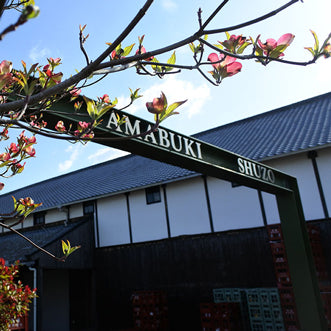 Entrance to the brewery in Saga. Photos courtesy of Amabuki Shuzo
Entrance to the brewery in Saga. Photos courtesy of Amabuki ShuzoIt’s clear that whenever Amabuki comes out with a new release, it looks like they are having fun. Known for their commitment to using flower yeasts exclusively for the past 20 years, Amabuki Shuzo pioneered sake yeast experimentation when it wasn’t as accepted as it is today. Nowadays, we’ve seen sake being made with fruit, flower, and honey yeasts, as we will discover in the next two months in the club.
Over the years Wataru Hosokawa, the director of overseas business development has helped me understand Amabuki and their history. “Flower yeasts for sake use were founded by Professor Hisayasu Nakata at Tokyo University of Agriculture over 20 years ago,” says Hosokawa, “Our president and his younger brother, Sotaro Kinoshita and Daisuke Kinoshita studied sake brewing under Professor Nakata. After the brothers graduated, they got a call from Nakata and Nakata told them that he found interesting yeasts from flowers in nature. Nakata made sake with the yeasts and sent samples to the brothers. The brothers were impressed, and decided that these yeasts were exactly what they were looking for, ultimately defining their brewery.”
Most sake is made with kyokai kobo, yeasts provided by the Brewing Society of Japan that are referred to by their numbers. The most common yeasts used today are No. 7 and No. 9. While there are numerous others offered by the association, using yeasts outside of what the association has to offer opens the horizons for very different aromatic expressions in the final sake.
The Kinoshita brothers have made their mark and continue to stand out from the rest. Being at the shop, I often get customers who ask for Amabuki by name, which is a rarity for sake. From their striking labels to their mission to promote flower yeasts, I love that their sakes are memorable in the minds of sake-lovers.
As a bonus, if you ever make it to Saga Prefecture, Hosokawa-san invites Gumi members to take the brewery tour. Tours are currently held on weekdays only and you can register online here.
Please read our interview with Hosokawa-san here to learn more about the concepts and processes behind Amabuki Shuzo.
Yoko (Co-Founder, Umami Mart)

I Love Sushi Junmai
Amabuki Brewery (Saga, Japan)
Seimaibuai: Saga no Hana 60%, SMV: +8, Acidity: 1.6, Yeast: Strawberry Flower and Queen of the Night Flower Queen of the Night Flower
It’s time for a temaki party! This light sake is made to pair with raw fish and vinegared rice. Hosokawa-san of the Amabuki says they use strawberry flower and queen of the night flower yeasts because “Both of them create a lot of malic acid, which results in a very refreshing taste.” This lighter style complements rich red fish, like maguro in particular, and also balances the tartness of sushi rice. I especially loved it with ikura! “The Queen of the Night is large with pure white color, shaped like long, narrow petals arranged in a starburst pattern with multiple layers,” he explains, “It has a strong, sweet, and intoxicating fragrance.” Enjoy this sake chilled in a flute or wine glass, sushi or a caprese salad – both perfect summer dinner ideas.
 I Love Sushi Junmai paired with ikura
I Love Sushi Junmai paired with ikura

Banana Kobo Nama Junmai Daiginjo
Amabuki Brewery (Saga, Japan)
Seimaibuai: Jugumu from Fukuoka 50%, SMV: -10, Acidity: 2.5, Yeast: Undisclosed
This bottle is shrouded in mystery. I asked about how they isolate the yeast from bananas, only to have Hosokawa-san tell me, “Unfortunately, I cannot disclose many secrets, but I can share that a professor at Tokyo University of Agriculture developed this banana yeast. There is one thing I can tell you about this yeast: it is not isolated from bananas.” Dun, dun, duuuun!!! I’ll take a wild guess and say they may have used Begonia and/or Rhododendron yeast (see chart provided by the brewery to the left) to get these intense banana aromas. This bright sake balancing fruitiness with acidity is as impactful as the label which sports a banana-yellow moon. Marinate and skewer shrimp or tofu in cayenne, honey, cilantro and EVOO, grill them, and pair chilled with this sake.
 Banana Kobo Nama Junmai Daiginjo paired with honey and cayenne marinated grilled shrimp
Banana Kobo Nama Junmai Daiginjo paired with honey and cayenne marinated grilled shrimp
Sake Gumi is our monthly sake subscription service with 150 members throughout the country. Join today!



Comments (0)
There are no comments for this article. Be the first one to leave a message!